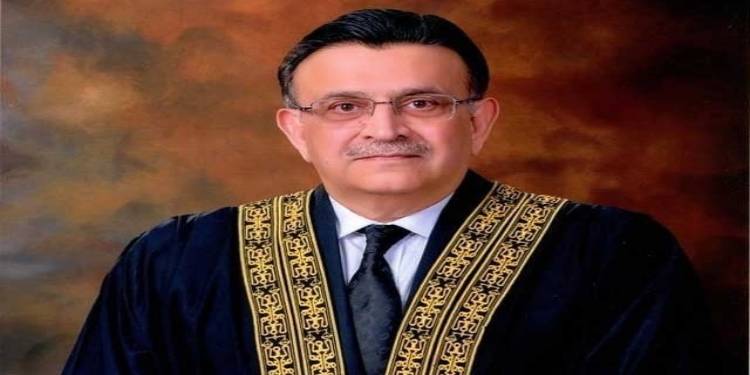
The Supreme Court (SC) has rejected the government’s plea seeking the formation of a full court bench to hear a set of petitions challenging the trial of civilians in military courts.
The case was heard by a six-member bench, headed by Chief Justice of Pakistan (CJP) Umar Ata Bandial and comprising Justice Ijazul Ahsan, Justice Munib Akhtar, Justice Yahya Afridi, Justice Sayyed Mazahar Ali Akbar Naqvi, and Justice Ayesha A. Malik.
During the hearing, the chief justice stated that civilian citizens should not be subject to trials that are not in accordance with the Constitution. The CJP declared that a full court could not be formed. During the proceedings, Attorney General of Pakistan (AGP) Mansoor Usman then requested that a full court comprised of the available judges be established.
During the hearing on Monday, the federal government said that acts of violence against the armed forces and vandalism against military facilities harmed Pakistan's security, interests, and defense since they directly threatened its national security.
In a reply submitted on behalf of the federal government, Awan requested that the petitions challenging the trials of civilians by military courts be dismissed.
The reply indicated that multiple FIRs were filed against the culprits as a result of the events on May 9, 2023.
The stipulations of the Army Act are not mentioned in all FIRs. It said that the Supreme Court ruled in the case of FIA v. Hamid Ali Shah that the nature of the charges made out depends more on the information contained in an FIR than it does on whether a specific legislative provision is mentioned.
According to Article 199 of the Constitution, which among other things gives the High Courts the authority to "make an order [...] as may be appropriate for the enforcement of any of the fundamental rights," it was said that the issues mentioned in the petitions can be effectively decided by the High Courts.
It claimed that the entire cost of the damage was Rs. 2,539.19 million, including damages of Rs. 1,982.95 million to military facilities, equipment, and vehicles.
The case was heard by a six-member bench, headed by Chief Justice of Pakistan (CJP) Umar Ata Bandial and comprising Justice Ijazul Ahsan, Justice Munib Akhtar, Justice Yahya Afridi, Justice Sayyed Mazahar Ali Akbar Naqvi, and Justice Ayesha A. Malik.
During the hearing, the chief justice stated that civilian citizens should not be subject to trials that are not in accordance with the Constitution. The CJP declared that a full court could not be formed. During the proceedings, Attorney General of Pakistan (AGP) Mansoor Usman then requested that a full court comprised of the available judges be established.
During the hearing on Monday, the federal government said that acts of violence against the armed forces and vandalism against military facilities harmed Pakistan's security, interests, and defense since they directly threatened its national security.
In a reply submitted on behalf of the federal government, Awan requested that the petitions challenging the trials of civilians by military courts be dismissed.
The reply indicated that multiple FIRs were filed against the culprits as a result of the events on May 9, 2023.
The stipulations of the Army Act are not mentioned in all FIRs. It said that the Supreme Court ruled in the case of FIA v. Hamid Ali Shah that the nature of the charges made out depends more on the information contained in an FIR than it does on whether a specific legislative provision is mentioned.
According to Article 199 of the Constitution, which among other things gives the High Courts the authority to "make an order [...] as may be appropriate for the enforcement of any of the fundamental rights," it was said that the issues mentioned in the petitions can be effectively decided by the High Courts.
It claimed that the entire cost of the damage was Rs. 2,539.19 million, including damages of Rs. 1,982.95 million to military facilities, equipment, and vehicles.

